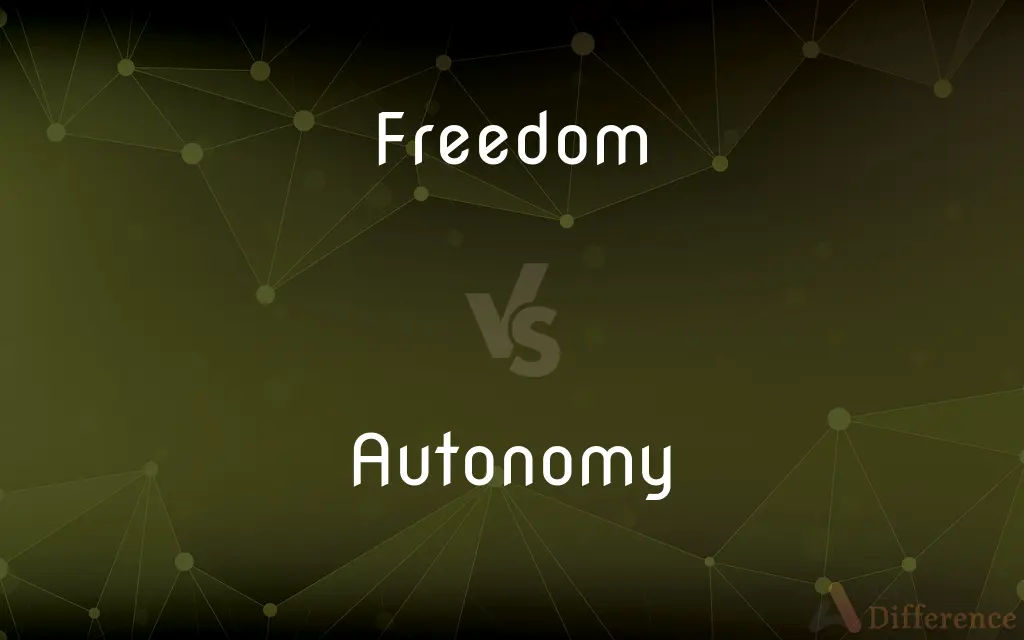Freedom vs. Autonomy — What's the Difference?
Edited by Tayyaba Rehman — By Urooj Arif — Updated on March 13, 2024
Freedom emphasizes the absence of constraints and the right to act, speak, or think as one wishes, while autonomy focuses on self-governance and the ability to make decisions independently.

Difference Between Freedom and Autonomy
Table of Contents
ADVERTISEMENT
Key Differences
Freedom typically refers to the power or right to act, speak, or think without hindrance or restraint. It is often associated with liberty and the absence of oppression or coercion. Whereas, autonomy is more about self-governance or self-rule, emphasizing the capacity of an individual or group to make their own decisions without external control.
While freedom is a broader concept that can apply to various aspects of life and society, including political, social, and personal freedoms, autonomy is more specific, often related to moral, ethical, or organizational contexts. Autonomy underlines the importance of having the freedom to make one's own choices, particularly in matters that pertain to an individual's or entity's internal affairs.
Freedom is a fundamental human right recognized globally, pivotal in shaping democracies and influencing laws and ethics. It is foundational in allowing individuals to express themselves, pursue happiness, and engage in societal participation. On the other hand, autonomy plays a crucial role in ethics, personal development, and in the functioning of institutions, emphasizing the right to self-determination and independent thought.
In the context of political and social systems, freedom often refers to collective rights and liberties protected by laws and institutions, safeguarding individual and group freedoms from infringement. Conversely, autonomy can refer to the self-governing powers of entities within these systems, like states or organizations, allowing them to operate independently within the confines of a larger framework.
Understanding the nuances between freedom and autonomy is vital in discussions about rights, ethics, and governance. Freedom lays the groundwork for a just society, where individuals can live without undue restriction, while autonomy ensures that individuals and entities have the agency to make decisions that reflect their values and needs.
ADVERTISEMENT
Comparison Chart
Definition
The state of not being imprisoned or enslaved; the power to act, speak, or think as one wants.
Self-governing; independence in one's thoughts or actions.
Key Focus
Absence of external constraints.
Capacity for self-determination and self-governance.
Context
Can be applied broadly across political, social, and personal spheres.
Often discussed in relation to moral, ethical, or organizational settings.
Relation to Rights
Often associated with basic human rights and liberties.
Linked to the principle of self-determination.
Application
Influences laws, social norms, and individual behaviors in a wide array of contexts.
Primarily concerns the ability of individuals or entities to make independent decisions within a specific context.
Compare with Definitions
Freedom
Political freedom involves the right to participate in the democratic process.
Voting in the elections is a fundamental aspect of political freedom.
Autonomy
The right or condition of self-government.
The new policy granted more autonomy to local governments.
Freedom
The condition of being free from restraints or restrictions.
The new policy enhanced the citizens' freedom to travel abroad.
Autonomy
Personal autonomy refers to the capacity to make one's own decisions without external influence.
The law respects an individual's autonomy in making healthcare decisions.
Freedom
Freedom is a universal value that underpins human dignity and rights.
The struggle for freedom has been at the heart of many historical movements.
Autonomy
Autonomy is valued for promoting independence and self-reliance.
Encouraging autonomy in children helps develop their problem-solving skills.
Freedom
Freedom may be restricted by laws or social norms to protect public safety and order.
The government imposed limitations on freedom of assembly to maintain public safety.
Autonomy
Autonomy can apply to individuals, institutions, or regions within a larger entity.
The university's autonomy allows it to set its own academic standards.
Freedom
Freedom encompasses various dimensions, including freedom of speech, movement, and association.
Freedom of speech is a cornerstone of a democratic society.
Autonomy
Autonomy may be constrained by overarching legal or ethical frameworks.
While the hospital respects patient autonomy, treatments must adhere to medical ethics.
Freedom
Freedom, generally, is having the ability to act or change without constraint. Something is "free" if it can change easily and is not constrained in its present state.
Autonomy
In developmental psychology and moral, political, and bioethical philosophy, autonomy is the capacity to make an informed, uncoerced decision. Autonomous organizations or institutions are independent or self-governing.
Freedom
The condition of not being in prison or captivity
Gave the prisoners their freedom.
Autonomy
The condition or quality of being autonomous; independence.
Freedom
The condition of being free of restraints, especially the ability to act without control or interference by another or by circumstance
In retirement they finally got the freedom to travel.
Autonomy
Self-government or the right of self-government; self-determination.
Freedom
The condition of not being controlled by another nation or political power; political independence.
Autonomy
Self-government with respect to local or internal affairs
Granted autonomy to a national minority.
Freedom
The condition of not being subject to a despotic or oppressive power; civil liberty.
Autonomy
A self-governing state, community, or group.
Freedom
The condition of not being constrained or restricted in a specific aspect of life by a government or other power
Freedom of assembly.
Autonomy
(uncountable) The right or condition of self-government; freedom to act or function independently.
Freedom
The condition of not being a slave.
Autonomy
A self-governing country or region.
Freedom
The condition of not being affected or restricted by a given circumstance or condition
Freedom from want.
Autonomy
The capacity to make an informed, uncoerced decision.
Freedom
The condition of not being bound by established conventions or rules
The new style of painting gave artists new freedoms.
Autonomy
The capacity of a system to make a decision about its actions without the involvement of another system or operator.
Freedom
The capacity to act by choice rather than by determination, as from fate or a deity; free will
We have the freedom to do as we please all afternoon.
Autonomy
The status of a church whose highest-ranking bishop is appointed by the patriarch of the mother church, but which is self-governing in all other respects. Compare autocephaly.
Freedom
The right to unrestricted use; full access
Was given the freedom of their research facilities.
Autonomy
The power or right of self-government; self-government, or political independence, of a city or a state.
Freedom
Ease or facility of movement
Loose sports clothing, giving the wearer freedom.
Autonomy
The sovereignty of reason in the sphere of morals; or man's power, as possessed of reason, to give law to himself. In this, according to Kant, consist the true nature and only possible proof of liberty.
Freedom
(Archaic) Boldness in behavior; lack of modesty or reserve.
Autonomy
Immunity from arbitrary exercise of authority: political independence
Freedom
(uncountable) The state of being free, of not being imprisoned or enslaved.
Having recently been released from prison, he didn't know what to do with his newfound freedom.
Autonomy
Personal independence
Freedom
(countable) The lack of a specific constraint, or of constraints in general; a state of being free, unconstrained.
Freedom of speech is a basic democratic value.
People in our city enjoy many freedoms.
Every child has a right to freedom from fear and freedom from want.
Freedom
The right or privilege of unrestricted use or access
Freedom of a city
Freedom
Frankness; openness; unreservedness.
Freedom
Improper familiarity; violation of the rules of decorum.
Freedom
The state of being free; exemption from the power and control of another; liberty; independence.
Made captive, yet deserving freedom more.
Freedom
Privileges; franchises; immunities.
Your charter and your caty's freedom.
Freedom
Exemption from necessity, in choise and action; as, the freedom of the will.
Freedom
Ease; facility; as, he speaks or acts with freedom.
Freedom
Frankness; openness; unreservedness.
I emboldened spake and freedom used.
Freedom
Improper familiarity; violation of the rules of decorum; license.
Freedom
Generosity; liberality.
Freedom
The condition of being free; the power to act or speak or think without externally imposed restraints
Freedom
Immunity from an obligation or duty
Common Curiosities
Can you have autonomy without freedom?
Autonomy requires a degree of freedom, particularly in decision-making, but it is more focused on self-governance within available freedoms.
Is freedom always positive?
While generally positive, unrestricted freedom can lead to conflicts with others' rights and societal norms.
How is autonomy important in healthcare?
Autonomy is crucial in healthcare for respecting patients' rights to make informed decisions about their treatments.
Can organizations have autonomy?
Yes, organizations can have autonomy in making decisions within their governance structures.
Why is autonomy important in education?
Autonomy in education encourages critical thinking and personal responsibility in learning.
How do societies balance freedom and social order?
Societies balance freedom and order through laws and norms that protect individual freedoms while ensuring collective safety and harmony.
What role does autonomy play in democracy?
Autonomy is vital in democracy as it supports individuals' and entities' rights to participate and make decisions within the democratic framework.
What is autonomy?
Autonomy is the capacity for self-governance and making decisions without external interference.
Is freedom a human right?
Yes, freedom is recognized as a fundamental human right in many international declarations.
What is freedom?
Freedom is the state of being free from restraints, allowing individuals to act, speak, or think as they wish.
How do freedom and autonomy differ?
Freedom focuses on the absence of external constraints, while autonomy emphasizes self-determination and governance.
Do laws limit freedom?
Laws can limit certain freedoms to ensure public safety, order, and the rights of others.
How does autonomy contribute to personal development?
Autonomy fosters independence and self-reliance, essential for personal growth and development.
Can freedom exist in a controlled environment?
Some level of freedom can exist within controlled environments, but it may be limited by the rules of the environment.
Can autonomy lead to isolation?
While autonomy promotes independence, excessive focus on autonomy without collaboration can lead to isolation in some contexts.
Share Your Discovery

Previous Comparison
Pack vs. Packet
Next Comparison
Data vs. PayloadAuthor Spotlight
Written by
Urooj ArifUrooj is a skilled content writer at Ask Difference, known for her exceptional ability to simplify complex topics into engaging and informative content. With a passion for research and a flair for clear, concise writing, she consistently delivers articles that resonate with our diverse audience.
Edited by
Tayyaba RehmanTayyaba Rehman is a distinguished writer, currently serving as a primary contributor to askdifference.com. As a researcher in semantics and etymology, Tayyaba's passion for the complexity of languages and their distinctions has found a perfect home on the platform. Tayyaba delves into the intricacies of language, distinguishing between commonly confused words and phrases, thereby providing clarity for readers worldwide.













































